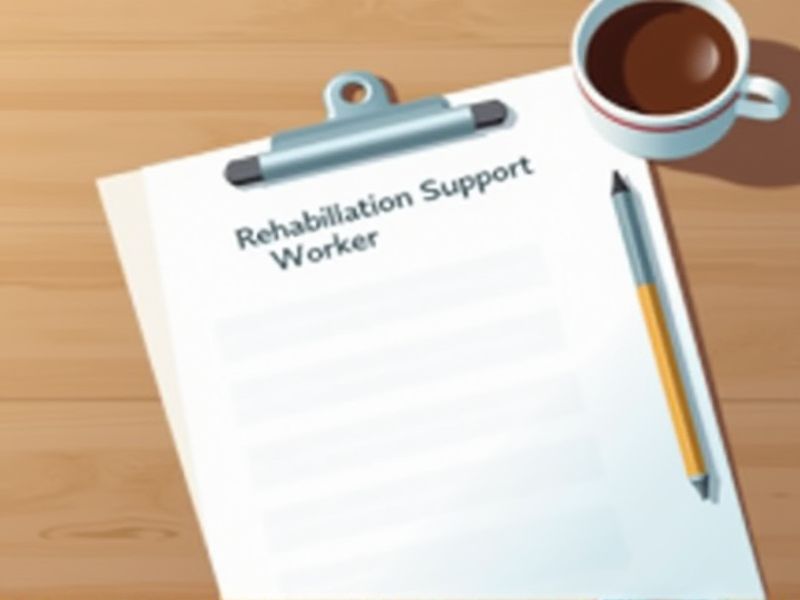
Rehabilitation Support Workers play a crucial role in assisting individuals with recovery and improving their quality of life. Specific certifications ensure these professionals possess the necessary skills and knowledge to handle diverse rehabilitation needs effectively. These credentials enhance the worker's ability to deliver safe, ethical, and evidence-based support. Let's delve into key certifications essential for a Rehabilitation Support Worker to succeed in this field.
CPR and First Aid Certification
CPR and First Aid Certification equips rehabilitation support workers with essential skills to respond effectively in emergency situations, preventing potential life-threatening conditions. It instills confidence in handling unexpected medical emergencies, ensuring safer environments for both clients and workers. Proper certification ensures compliance with industry standards, reducing liability risks for employers and enhancing job prospects for workers. Access to certified first aid skills leads to timely interventions, which can significantly improve patient outcomes during rehabilitation.
Basic Life Support (BLS) Certification
Rehabilitation Support Workers frequently encounter clients who may experience medical emergencies, and BLS Certification provides them with the skills to respond effectively. The certification ensures that workers can perform essential procedures, such as CPR, which can significantly improve a patient's survival chances. Having BLS training instills confidence in both the staff and clients, knowing capable assistance is available in case of critical incidents. Employers often require this certification to ensure a standard level of emergency preparedness and competence within their teams.
Mental Health First Aid Certification
Mental Health First Aid Certification equips rehabilitation support workers with essential skills to recognize and respond to mental health crises, facilitating timely intervention. Training enhances understanding of mental health conditions, leading to more empathetic and effective support for individuals in rehabilitation. The certification helps in reducing stigma associated with mental health by encouraging open conversations and promoting informed care strategies. Possessing this certification can improve client outcomes by ensuring the application of best practices in mental health support within rehabilitation settings.
Disability Support Worker Certificate
Holding a Disability Support Worker Certificate equips individuals with crucial skills and knowledge needed for effective rehabilitation support. Certification ensures compliance with industry standards, enhancing the quality of care provided to individuals with disabilities. It also verifies a worker's competence in handling complex situations, increasing trust among employers and clients. Possessing this certification frequently leads to better job opportunities and career advancements within the sector.
Safe Patient Handling Certification
Safe Patient Handling Certification is necessary to reduce the risk of injury to both patients and rehabilitation support workers, ensuring a safer environment. Trained workers can effectively use equipment and techniques that enhance patient mobility and recovery. Certification contributes to meeting regulatory and institutional safety standards, minimizing legal risks for healthcare facilities. Proficiency in safe handling promotes patient trust and satisfaction by providing care with competence and care.
Crisis Intervention Certification
Crisis intervention certification equips rehabilitation support workers with the skills needed to de-escalate potentially volatile situations, reducing the risk of harm to both clients and staff. Certified workers demonstrate increased competency in understanding mental health crises, thereby providing more effective support to individuals in distress. The certification helps establish a standard of care that can improve patient outcomes and enhance the credibility of the support services offered. Employers often require such certification to ensure their staff are prepared to handle emergencies, which can mitigate legal and ethical liabilities for the organization.
Nonviolent Crisis Intervention Certification
Nonviolent Crisis Intervention Certification equips Rehabilitation Support Workers with the skills to safely de-escalate potentially harmful situations. This training reduces the risk of injury for both workers and clients, fostering a secure environment. Employers value certified individuals for their professionalism and preparedness in managing crises. The certification aligns with legal and organizational standards, ensuring compliance with safety regulations.
Conflict Resolution Certification
Conflict resolution certification equips rehabilitation support workers with essential communication skills, enabling them to de-escalate tense situations, which leads to more effective patient care. This training helps workers understand diverse perspectives, reducing misunderstandings and fostering a collaborative environment. Well-trained workers contribute to a safer workspace, minimizing potential harm or disruption. Certification can enhance a worker's credentials, increasing professional opportunities and recognition in the field.
Certified Peer Support Specialist
Certified Peer Support Specialists bring personal experience with recovery, providing authentic empathy that enhances trust between clients and the support team. Their presence often results in better client engagement and retention, as individuals are more likely to relate to someone who has navigated similar challenges. The integration of Peer Support Specialists can facilitate improved mental health outcomes, as they empower clients by modeling positive behaviors and coping strategies. As part of a multidisciplinary team, they serve as a bridge between clinical staff and clients, ensuring that care plans are grounded in real-world recovery experiences.
Assistive Technology Training Certification
Obtaining Assistive Technology Training Certification equips Rehabilitation Support Workers with specialized skills to effectively support individuals with disabilities. Proper certification ensures standardized knowledge, enhancing the quality of care and assistance provided. Workers can better assess needs and implement appropriate technology solutions, fostering greater independence for clients. Certified professionals are more likely to gain trust from both employers and clients, thus increasing employment opportunities in the rehabilitation sector.
Summary
When you, as a Rehabilitation Support Worker, acquire certifications, you can expect enhanced job prospects due to increased qualification visibility. Certification can lead you to better career advancement opportunities because of recognized expertise. You'll likely gain access to specialized roles, which often come with higher pay scales. Employers might prefer certified individuals, improving your job security and professional credibility.
